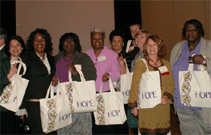Sewing the Seeds of Good Health
May 2008

Representatives from the University of North Carolina Center for Health Promotion and Disease Prevention show off their Threads of HOPE bags at the Prevention Research Centers meeting in March 2008. The bags are made of sustainable materials and produced by rural North Carolina women. Enlarge picture.
At the Prevention Research Centers (PRC) annual program meeting held in
March, each of the 300 registrants received a conference bag that is a
product of community prevention research. The PRC Program purchased the bags
from Threads of HOPE, a small business being developed by community partners
and the University of North Carolina at Chapel Hill's Center for Health
Promotion and Disease Prevention, one of 33 CDC-funded PRCs.
Threads of HOPE is a spinoff of the center's core research project, HOPE
Works, in which trained community facilitators run support groups enabling
women to help each other make health and lifestyle changes. The women—who
are African American, American Indian (Coharie Tribe), Latina, or white—live
in Sampson and Duplin Counties in eastern North Carolina, where unemployment
has been high since the mid-1990s when tobacco and textile production left
the area. In 2000, the poverty rate was close to 20 percent of households.
Fifteen years of researcher-community collaboration in the area made it
clear that income, education, occupation, and community factors are playing
a greater role in health than individual health behaviors or access to
health care. The economic depression contributed to a sense of hopelessness
that made some women less motivated than before to address health behaviors.
"Introducing a small-business component to the research was inspired by
microenterprise grants that have worked in developing countries," said Marci
Campbell, principal investigator of the core research.
The women who participate in the community-owned business will receive a
living wage, training in textile production and business management, health
insurance, a chance to pursue higher education, and exposure to health
promotion interventions—mostly about nutrition and physical activity.
"It's our goal for this [enterprise] to be a laboratory to train the women,"
said Patricia Peterson, a community organizer for the project.
The project's organizers recruited Mae Tuggle, a seamstress and business
owner in Wallace, North Carolina, to train women and coordinate the initial
sewing orders. Ms. Tuggle, who attended the PRC meeting, said the training
will cover using the right material and threads, operating the machines, and
laying out, cutting, and sewing the bags. She has taught sewing in factories
and at a community college. To find women to join the team, the organizers
are targeting women laid off from jobs in textile factories.
"Where we are there are very few sewing industry jobs," Ms. Tuggle said. She
has been worried about the lack of jobs in the area. "For me this is like a
destiny step."

Mike Waller, deputy director of the CDC's Division of Adult and Community Health (DACH), and Wayne Giles, DACH director, display Threads of HOPE bags they received at the PRC meeting in March 2008.
The bags, made from natural cotton twill using environmentally friendly
methods, will be sold for use in conferences and for personal use in other
areas of North Carolina and the rest of the country. Threads of HOPE will
make 500 bags for a North Carolina cancer survivor conference in June, and
in the week following the meeting, the enterprise received three inquiries
about future orders.
Organizers believe that although the bags are more expensive than some
conference bags, people will pay more for products made using high-quality,
environmentally friendly materials, and fair trade principles. The PRC
conference bags can also be reused—to tote groceries or other items. The
University of North Carolina at Chapel Hill business school advised the
project on marketing strategy.
The project's partners include North Carolina State University design
students, who created the logo used on the PRC conference bag. The logo
represents women from the four ethnic groups that are part of HOPE Works.
Researchers from around the country responded positively to the bags at the
PRC conference.
"You inspire me," said Oregon PRC researcher Bill Lambert, to the Threads of
HOPE team. He said the model used in North Carolina could also work with the
American Indian communities his PRC works with. "This is the basis of
allowing people to have control and opportunity for their lives," Mr.
Lambert said. "That's the excitement of these meetings—you hear new ideas."
Threads of HOPE community organizer Imana Rivera said the community had the
right skills and the right needs to become involved with the project.
"We can kindle the flames of hope again," she said. "We need to. We need
something to look forward to."
![]() One or more documents on this Web page is available in Portable Document Format
(PDF). You will need Acrobat
Reader (a free application) to view and print these documents.
One or more documents on this Web page is available in Portable Document Format
(PDF). You will need Acrobat
Reader (a free application) to view and print these documents.
- Page last reviewed: May 19, 2008
- Page last updated: May 19, 2008
- Content source: Division of Adult and Community Health, National Center for Chronic Disease Prevention and Health Promotion
Get email updates
To receive email updates about this site, enter your email address:
Contact Us:
- Prevention Research Centers
4770 Buford Hwy, NE
MS K-45
Atlanta, GA 30341-3717 - cdcinfo@cdc.gov

